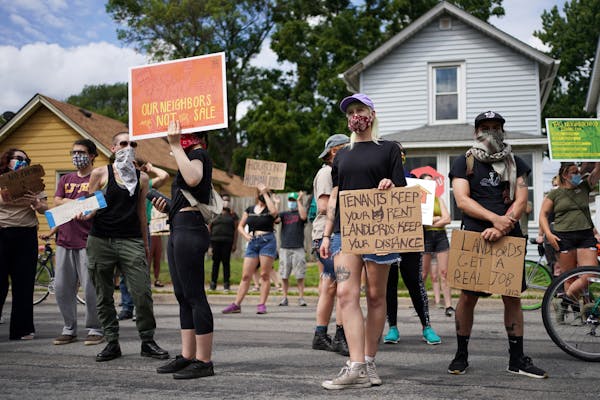For Minneapolis landlord Colin Gatling, the first sign of trouble with his new tenant was the foot traffic at all hours.
One day his tenant left the unit door open, and Gatling described in a court filing what he saw: an "unsafe, filthy, garbage-filled heroin den" complete with mini baggies, tourniquets and needles.
Despite the statewide moratorium on evictions, Gatling was able to get a judge to remove his tenant under exemptions designed to protect property and other tenants. Gatling said he spent well over $1,000 filing the paperwork for the eviction and to rent a U-Haul to get rid of possessions the tenant left behind.
"It was pretty clear; you couldn't argue against it," Gatling said. "I'm sort of thankful it was as bad as it was because we were able to get him out."
Since March, Gov. Tim Walz has halted evictions as the coronavirus pandemic wears on and Minnesotans stay home as much as possible to social distance. But Gatling's action was one of at least 171 cases statewide leading to an eviction judgment since then, after a judge determined the tenant endangered the safety of other residents or violated other laws.
A Star Tribune review of about 50 of those cases selected at random reveals that Minnesota residents have been forced to leave properties for police calls to their units, selling or using drugs, unauthorized guests and property damage.
While eviction judgments in the state also include commercial tenants, the analysis focused only on housing related evictions. The analysis also does not include expunged evictions.
In more than half of the filings examined, police calls to the property for fights, noise, arrest warrants and presence of drugs were key factors in why landlords filed for an eviction. But the files also showed some of the more extreme incidents where landlords were able to quickly file for an eviction.
One St. Paul tenant started a fire in the common area, threw a cigarette on it and proceeded to spray flammable liquid on it and then left without telling anyone. A Mankato tenant filled a kiddie pool in her unit, causing flooding and damage to the unit below. A tenant in Marshall stole several of the property's security cameras from the ceilings and then pulled a gun on the two police officers who arrived at his unit.
Another St. Paul tenant was caught on security camera walking the hallways with an unsheathed machete at 2:30 in the morning for over two hours, sometimes knocking on other tenants' doors.
Two Minneapolis tenants were evicted after they stabbed each other in a knife fight, leaving blood smeared in the common areas of the building.
Other cases included threats and assaults on tenants and landlords and multiple instances of landlords dealing with biohazards like smeared feces all over units or in buckets.
While the eviction moratorium prevents property owners from evicting tenants for failing to pay rent, the Star Tribune found across 18 cases that landlords also noted a total of $45,886 in unpaid rent in their filings.
Not all charges hold up
Luke Grundman, a managing attorney for housing with Mid-Minnesota Legal Aid, an organization focused on tenants' rights, said that in some of the cases his office has helped with, tenants are being accused of things like smoking marijuana or severe property damage.
But it's soon found that those allegations are not true and landlords lack proof. Grundman pointed out that while tenant behavior does need to be handled appropriately, he's found landlords often argue for evictions for reasons such as needing a family member to move into the unit.
"The moratorium is helping a ton but it's certainly not airtight. There are landlords out here who are just trying to figure out ways around it," Grundman said.
A lawyer who represents landlords, Greg Thompson, said he's managed to persuade judges to grant a hearing in only about half of the cases he's pursued for property owners in Minnesota.
Thompson, an attorney with Anderson, Bottrell, Sanden & Thompson in Fargo, N.D., pointed out that having to write up affidavits and find other evidence has increased the time it takes to move eviction cases forward.
"There's a number of other hoops that we're having to jump through here that's adding to the cost," Thompson said.
Gatling's troubles began when his Airbnb reservations dried up as the pandemic hit the state. The Whittier neighborhood landlord saw thousands of dollars in income vanish and soon found himself posting on Facebook hoping someone might need a place to stay for the short term. An acquaintance from 20 years ago popped up in his Facebook message saying he could move in. His parents would be paying his rent and he wouldn't need to stay long.
"Because of the larger situation of very quickly losing all of my income and being worried about finding a tenant, I let this person move in without doing due diligence," Gatling said. "It ended up being an absolute nightmare."
He said having the photos from the drug den was helpful for building his case. The hearing in May took only about 15 minutes because the tenant did not show.
Since then, Gatling has reopened his Airbnb listings and has seen an uptick in reservations. He said he could not imagine being stuck with the tenant long term and he's thankful the ordeal is behind him.
"You hear horror stories about landlord-tenant situations and … I've been lucky up until now," Gatling said. "Now I have my one horror story to keep me educated about what can happen if you're not careful."

Want to share info with the Star Tribune? How to do it securely

'Safe recovery sites' would offer syringes, naloxone and more to people using drugs. The plan could be in peril.
New Minnesota GOP leaders seek peace with party's anti-establishment wing

Who is Republican Lisa Demuth, Minnesota's first House speaker of color?

